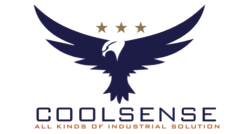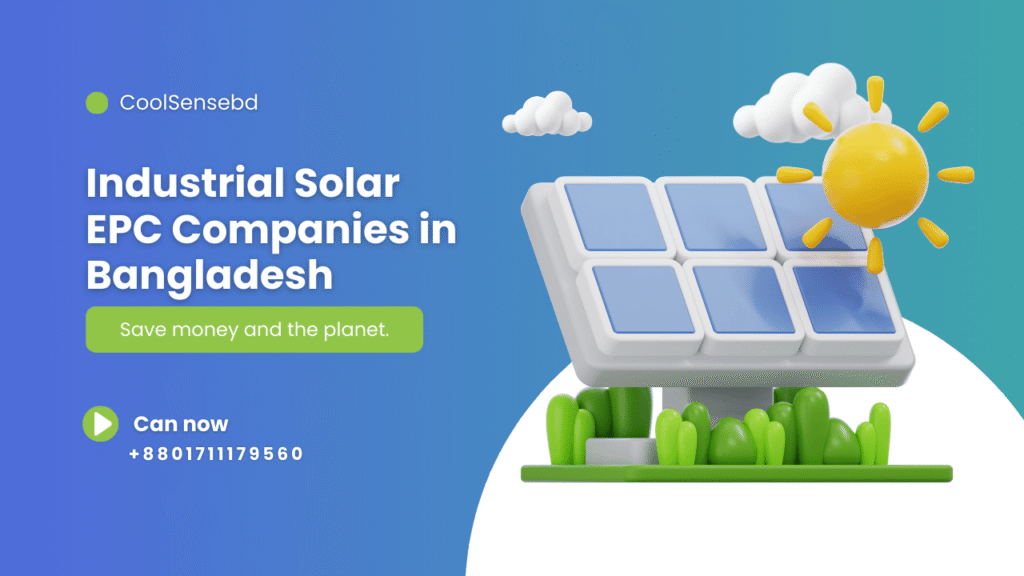Bangladesh’s industrial sector is the heartbeat of its economy, driving growth in textiles, pharmaceuticals, and manufacturing. But unreliable grid power and soaring energy costs are constant headaches for factory owners in hubs like Dhaka, Gazipur, and Chattogram. Enter industrial solar EPC (Engineering, Procurement, and Construction) companies—these are the folks who design, source, and install solar power systems tailored for heavy-duty industrial needs. With Bangladesh’s sunny climate and government incentives like tax breaks and net metering, solar EPC companies are helping factories slash costs, ensure reliable power, and meet global sustainability demands. This article dives into the role of industrial solar EPC companies in Bangladesh in 2025, their services, costs, and why CoolSense stands out as the top choice. Ready to explore? Visit CoolSense’s contact page for a free consultation.
What Is an Industrial Solar EPC Company?
An EPC company handles the full lifecycle of a solar project: Engineering (designing the system), Procurement (sourcing high-quality components), and Construction (installing and commissioning the setup). For industries, this means a one-stop shop for turning a rooftop or open space into a power-generating asset. These companies assess your factory’s energy needs, design a system to match, source panels and inverters, and install everything to keep your production lines running smoothly. They also often provide ongoing maintenance to ensure long-term performance.
In Bangladesh, where factories face frequent outages and grid tariffs of BDT 8–12 per kWh, EPC companies are critical for delivering solar solutions that cut costs and boost reliability. With the country aiming for 10% renewable energy by 2030, these firms are at the forefront of the green revolution.
Why Industrial Solar EPC Companies Are Essential in Bangladesh
Industrial facilities—like textile mills, cement plants, or food processing units—require consistent, high-capacity power for heavy machinery. Solar EPC companies offer tailored solutions, typically ranging from 50 kW to 1 MW or more, with key benefits:
- Cost Savings: Solar systems reduce electricity bills by 40–60%, offsetting grid and diesel costs (BDT 120–150 per liter).
- Energy Reliability: On-grid and hybrid systems ensure power during outages, critical for meeting export deadlines.
- Sustainability: Solar aligns with global buyer demands for eco-friendly production, supporting certifications like RE100 and LEED.
- Government Support: Tax exemptions, subsidies, and net metering lower upfront costs and allow factories to earn from excess power.
- End-to-End Expertise: EPC companies streamline the process, from design to maintenance, saving time and hassle.
With Bangladesh’s solar capacity projected to hit 1.5 GW by 2025 and 4–6 daily sun hours, industrial solar EPC companies are key to unlocking these benefits.
Costs of Industrial Solar EPC Projects in Bangladesh
The cost of an industrial solar EPC project depends on system size, type (on-grid, off-grid, or hybrid), and components like panels and inverters. Below are approximate price ranges for 2025, based on market data from sources like BDStall and industry insights:
- 50 kW System: BDT 3,900,000–4,500,000. Suitable for medium-sized factories, requiring ~4,000 sq. ft. of rooftop space. Example: BDStall’s 50 kW on-grid system at BDT 3,900,000.
- 100 kW System: BDT 7,500,000–8,500,000. Ideal for large manufacturing plants, needing ~8,000 sq. ft.
- 500 kW System: BDT 30,000,000–35,000,000. Designed for large industrial complexes.
- 1 MW System: BDT 50,000,000–60,000,000. Perfect for mega factories or industrial parks.
Cost Breakdown
- Solar Panels: BDT 20–40 per watt (e.g., BDT 4,000–7,100 for a 100-watt monocrystalline panel).
- Inverters: BDT 100,000–7,56,000 for industrial-grade inverters (e.g., Growatt or Huawei).
- Batteries (Optional): BDT 1,50,000–5,00,000 for lithium-ion or GEL batteries in hybrid/off-grid systems.
- Mounting and Wiring: BDT 1,00,000–5,00,000, depending on rooftop complexity.
- EPC Services: Engineering, procurement, and installation costs are typically 15–25% of the total, covering design, logistics, and setup.
On-grid systems are the most affordable, while hybrid systems (with batteries) cost more for 24/7 reliability. For a tailored quote, contact CoolSense via their contact page.
Services Offered by Industrial Solar EPC Companies
Top EPC companies in Bangladesh provide comprehensive services to ensure seamless solar adoption:
- Engineering:
- Site assessments to evaluate rooftop or land suitability.
- Load calculations to match system size to factory needs.
- Custom designs with high-efficiency monocrystalline panels and MPPT inverters.
- Procurement:
- Sourcing top-tier components from brands like Rahimafrooz, Trina Solar, or Longi.
- Ensuring durability for Bangladesh’s humid, stormy climate.
- Construction:
- Professional installation of panels, inverters, and mounting structures.
- Grid integration for on-grid systems or battery setup for hybrids.
- Commissioning and testing to ensure optimal performance.
- Maintenance and Support:
- Regular cleaning and inspections to maintain efficiency.
- Real-time monitoring via apps for performance tracking.
- 24/7 after-sales support for repairs and upgrades.
Top Industrial Solar EPC Companies in Bangladesh
Several EPC companies excel in delivering industrial solar solutions in Bangladesh. Here are the standouts for 2025:
- CoolSense:
- Offerings: 50 kW–1 MW systems with monocrystalline panels from Rahimafrooz, Walton, and Trina Solar. On-grid, off-grid, and hybrid solutions with smart monitoring.
- Price Range: BDT 3,900,000 (50 kW) to BDT 60,000,000 (1 MW).
- Why They’re Great: CoolSense offers competitive pricing, same-day delivery, and 24/7 after-sales support. Their free energy assessments ensure tailored solutions for factories in Dhaka and Gazipur. They specialize in turnkey EPC services, from design to maintenance.
- Notable Projects: 100 kW rooftop installations for textile factories in Gazipur.
- Solaric Global:
- Offerings: Large-scale rooftop projects (50 kW–1 MW) with CapEx/OpEx financing and EPC services.
- Price Range: BDT 3,900,000 (50 kW) to BDT 50,000,000 (1 MW).
- Why They’re Great: Solaric’s R&D-driven approach and 20 MWp of operational rooftop systems make them a leader for industrial clients in Chattogram’s KEPZ, with projects like RE100-certified installations.
- Cynergy Limited:
- Offerings: Comprehensive EPC services for 50 kW–500 kW systems, focusing on commercial and industrial clients with O&M support.
- Price Range: BDT 3,900,000 (50 kW) to BDT 30,000,000 (500 kW).
- Why They’re Great: Cynergy’s focus on sustainability and partnerships with global manufacturers ensures high-performance systems for factories.
- Rahimafrooz Renewable Energy Ltd. (RREL):
- Offerings: 50 kW–500 kW systems with monocrystalline/polycrystalline panels and robust EPC services.
- Price Range: BDT 3,900,000 (50 kW) to BDT 30,000,000 (500 kW).
- Why They’re Great: With over 25 years of experience, Rahimafrooz delivers reliable solutions for factories nationwide, backed by industry awards.
Benefits of Choosing an Industrial Solar EPC Company
- End-to-End Solutions: EPC companies handle everything, reducing complexity and ensuring quality.
- Cost Savings: A 100 kW system can generate 120,000–150,000 kWh annually, saving BDT 9,60,000–18,00,000 at current grid rates.
- Quick ROI: Payback periods of 4–6 years, with savings continuing for 25+ years.
- Sustainability: Meet global standards for eco-friendly production, attracting EU and US buyers.
- Reliability: Ensure uninterrupted operations with hybrid systems or grid-tied setups with net metering.
Factors Affecting Industrial Solar EPC Project Costs
- System Size: Larger systems (e.g., 1 MW) cost more due to increased panel and inverter needs.
- System Type: On-grid systems are cheaper; hybrid/off-grid systems add battery costs.
- Rooftop Complexity: Flat roofs are easier to install than sloped or shaded ones, reducing costs.
- Component Quality: Premium brands like Trina Solar cost more but offer better efficiency and warranties.
- Location: Urban installations in Dhaka may be simpler than rural ones in Khulna.
- Incentives: Government subsidies and net metering can offset 10–20% of costs.
Maintenance Tips for Industrial Solar Systems
To maximize performance, follow these tips:
- Regular Cleaning: Clean panels 2–4 times yearly with water and a soft cloth to remove dust.
- Professional Inspections: Schedule annual maintenance with CoolSense to check inverters, batteries, and structures.
- Monitor Performance: Use smart apps to track output and address issues quickly.
- Battery Care: For hybrid systems, monitor battery health and replace every 5–7 years.
- Structural Checks: Ensure mounting structures withstand Bangladesh’s storms.
Why Choose CoolSense as Your Industrial Solar EPC Company?
CoolSense is the leading industrial solar EPC company in Bangladesh, offering systems from 50 kW to 1 MW with brands like Rahimafrooz, Walton, and Trina Solar. With prices starting at BDT 3,900,000, their services include:
- Competitive Pricing: Affordable systems with flexible EMI options.
- Same-Day Delivery: Fast delivery to Dhaka, Gazipur, Chattogram, and nationwide.
- Turnkey EPC Services: From design to installation and maintenance.
- 24/7 After-Sales Support: Maintenance, spare parts, and emergency services.
CoolSense’s free energy assessments ensure systems match your factory’s needs, maximizing ROI. Visit their contact page to secure a sustainable power solution.
Conclusion
Industrial solar EPC companies in Bangladesh, like CoolSense, are transforming factories with reliable, cost-effective solar solutions. With project costs starting at BDT 3,900,000 for 50 kW systems and ROI in 4–6 years, these firms deliver sustainability and savings. CoolSense leads with competitive pricing, expert EPC services, and unmatched support, making them the top choice for industries. Power your factory sustainably—contact CoolSense via their contact page today for a free quote and embrace renewable energy for uninterrupted production.

